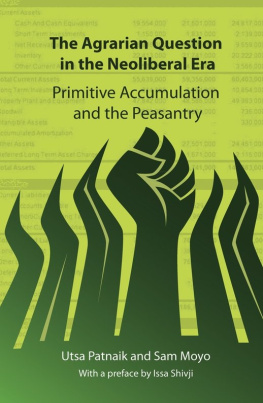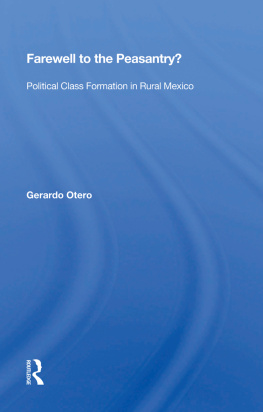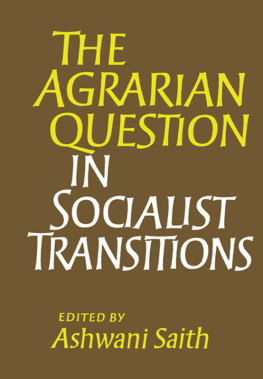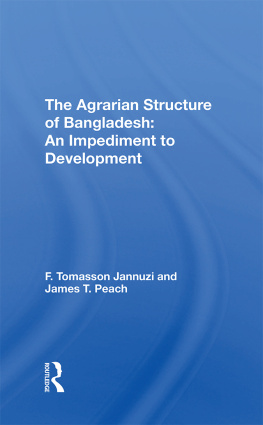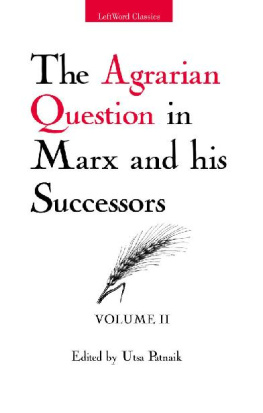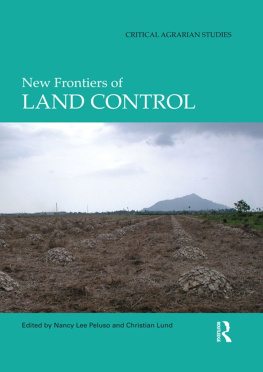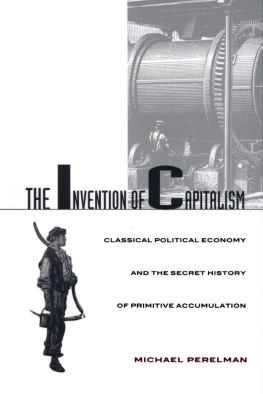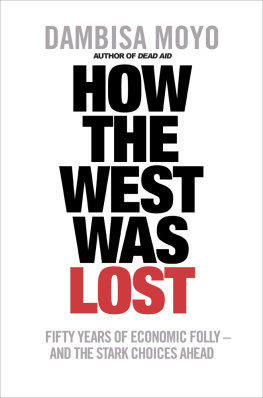Moyo Samson - The agrarian question in the neoliberal era: primitive accumulation and the peasantry
Here you can read online Moyo Samson - The agrarian question in the neoliberal era: primitive accumulation and the peasantry full text of the book (entire story) in english for free. Download pdf and epub, get meaning, cover and reviews about this ebook. City: Oxford, year: 2011;2012, publisher: Pambazuka Press, genre: Politics. Description of the work, (preface) as well as reviews are available. Best literature library LitArk.com created for fans of good reading and offers a wide selection of genres:
Romance novel
Science fiction
Adventure
Detective
Science
History
Home and family
Prose
Art
Politics
Computer
Non-fiction
Religion
Business
Children
Humor
Choose a favorite category and find really read worthwhile books. Enjoy immersion in the world of imagination, feel the emotions of the characters or learn something new for yourself, make an fascinating discovery.
- Book:The agrarian question in the neoliberal era: primitive accumulation and the peasantry
- Author:
- Publisher:Pambazuka Press
- Genre:
- Year:2011;2012
- City:Oxford
- Rating:3 / 5
- Favourites:Add to favourites
- Your mark:
- 60
- 1
- 2
- 3
- 4
- 5
The agrarian question in the neoliberal era: primitive accumulation and the peasantry: summary, description and annotation
We offer to read an annotation, description, summary or preface (depends on what the author of the book "The agrarian question in the neoliberal era: primitive accumulation and the peasantry" wrote himself). If you haven't found the necessary information about the book — write in the comments, we will try to find it.
Moyo Samson: author's other books
Who wrote The agrarian question in the neoliberal era: primitive accumulation and the peasantry? Find out the surname, the name of the author of the book and a list of all author's works by series.
The agrarian question in the neoliberal era: primitive accumulation and the peasantry — read online for free the complete book (whole text) full work
Below is the text of the book, divided by pages. System saving the place of the last page read, allows you to conveniently read the book "The agrarian question in the neoliberal era: primitive accumulation and the peasantry" online for free, without having to search again every time where you left off. Put a bookmark, and you can go to the page where you finished reading at any time.
Font size:
Interval:
Bookmark:
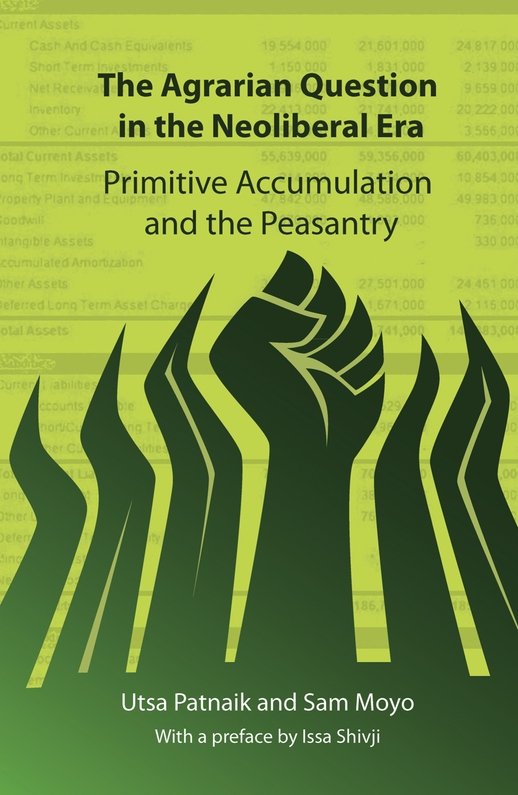
Utsa Patnaik has taught economics at Jawaharlal Nehru University, India since 1973 after completing her doctoral thesis at Oxford University. She has edited and co-edited several volumes including Agrarian Relations and Accumulation the Mode of Production Debate (1991), The Making of History Essays Presented to Irfan Habib (2000) and The Agrarian Question in Marx and his Successors in two volumes (2007, 2011). She has authored several books including Peasant Class Differentiation A Study in Method (1987) The Long Transition (1999) and The Republic of Hunger and Other Essays (2007).
Sam Moyo is executive director of the African Institute for Agrarian Studies (AIAS), based in Harare, Zimbabwe, and has worked on rural development issues focusing on land reform, agrarian change, environmental questions and social movements. He is currently the president of CODESRIA. His key books include The Land Question in Zimbabwe (1995), Land Reform Under Structural Adjustment in Zimbabwe (2000), African Land Questions, Agrarian Transitions and the State: Contradictions of Neoliberal Land Reforms (2008). His co-edited books include most recently Reclaiming the Nation: The Return of the National Question in Africa, Asia and Latin America (2011).
Issa G. Shivji is one of Africas leading experts on law and development issues. He is a prolific writer and researcher, producing books, monographs and articles, as well as a weekly column printed in national newspapers. Issa Shivji presently occupies the Mwalimu Julius Nyerere Research Chair in Pan-African Studies of the University of Dar es Salaam. Most recently, he has been working on the political economy of economic reforms in Tanzania. His publications include The Concept of Human Rights in Africa (1989), Silences in NGO Discourse: The Role and Future of NGOs in Africa (2007), Pan-Africanism or Pragmatism: Lessons of the Tanganyika Zanzibar Union (2008) and Where is Uhuru? Reflections on the Struggle for Democracy in Africa (2009).
THE HANDING OVER of millions of hectares of land to profiteering investors has become a central feature of 21st century Africa some 125 million acres, about the size of Sweden, have been grabbed by rich countries for industrial agricultural production in the pursuit of corporate profits. In their vigorous analyses, Utsa Patnaik and Sam Moyo show how the voracious appetite for land of the advanced capitalist world, whose large-scale agriculture still cannot meet its own consumption needs, has resulted in the dispossession of small producers in the global South. As Issa G. Shivji says in his preface, this has led to the destruction of people and their livelihoods and the pillaging of resources: land, forests, minerals, water, bioresources.
Patnaik and Moyo demonstrate that the classical land question, far from being rendered irrelevant by globalisation, today occupies centre stage because of this new thrust to acquire control over tropical land. The land question now requires the defence of the right of peasants, including tribal peoples, to their land and livelihoods. The authors argue that the increasingly visible resistance of all the dispossessed peasant classes and workers to this onslaught of imperialism and its domestic collaborators, and the achievement of regional food sovereignty and equitable development strategies, are all essential to salvage the progressive asset-loss suffered by the small producers and to combat increasing hunger in the global South.
Professor Utsa Patnaik has taught economics at Jawaharlal Nehru University, India for nearly 40 years.
Professor Sam Moyo is executive director of the African Institute for Agrarian Studies (AIAS), Harare.


It is indeed a privilege to have been asked to share with you some thoughts on the agrarian question in this, the momentous 50th year of the achievement of effective self-governance. The leader of Tanzanias freedom struggle, Mwalimu Julius Nyerere, was a towering personality who left the imprint of his egalitarian and socialist ideas not only on Tanzania but on Africa and the developing world. I feel doubly privileged to be with you during the Julius Nyerere Intellectual Festival Week. The struggle that colonised people waged was not for political independence alone, but also for a more just and egalitarian society, without which sovereignty cannot be sustained in the long run and in a real sense. That sovereignty is once more under attack in the current era of neoliberalism, and a new phase of struggle is necessary to preserve and enhance the gains of freedom.
The ascendancy of finance capital since the 1980s means that financial interests have come to dominate policymaking in the present era, both at the global level and through international financial institutions directing pliant governments, in almost all developing countries as well. The major pillars of neoliberal policies are: first, the imposition of deflationary cut-backs in state spending in nation states; second, openness of developing countries in particular to trade and capital flows through dismantling trade barriers; third, the dismantling, in developing countries only, of all price support mechanisms which existed earlier for stabilising prices for peasant producers, who constitute a large or major segment of the population; and fourth, a sustained attack on peasant-owned or -occupied land in the name of development.
These policies have been adversely affecting the livelihoods and access to basic needs of millions of poor people, who make up the majority of the population in the global South. The agrarian depression, which has turned into a crisis in many areas, is hardlymentioned in the critiques mounted of the neoliberal agenda, even by progressive writers. There is a deep theoretical failure in understanding the links between the agenda of finance capital, on the one hand, and the agrarian crisis in developing countries, on the other.
Yet history tells us that a deep financial and economic crisis has never occurred without a prior agrarian crisis, which tends to last even after the financial crisis abates. Consider the great depression of the inter-war period: it started not in 1929 as the conventional dating would have it, but years earlier from 1924 25 when global primary product prices started steadily falling. The reasons for this, in turn, were tied up with the dislocation of production in the belligerent countries during the war of inter-imperialist rivalry, the First World War of 1914 18. With the sharp decline in agricultural output in war-torn Europe there was expansion in agricultural output elsewhere which, with European recovery after the war, meant over-production relative to the lagging growth of mass incomes and of demand in the countries concerned. The downward pressure on global agricultural prices was so severe and prolonged that it led to the trade balances of major producing countries going into the red.
Then, as now, the wrong policy advice was given by the centre of financial power, the British Treasury, that the way to tackle external imbalance was to deflate the economy to reduce the level of activity by strongly cutting back budgetary spending by governments (Kindleberger 1987). We know today, after the theoretical labours of Keynes and Kalecki, that if one country does this it might benefit, but if all countries do it then it simply reduces aggregate demand in each country, reduces each countrys demand for other countries exports, and creates a deflationary spiral in which unemployment rises and the level of activity measured by output, as well as the extent of trade, reduces. The deep crisis this caused in the capitalist system, particularly in the late-industrialising countries such as Germany, Italy and Japan, led to belligerent militarisation as a solution, in which the size of armies ballooned and resources of other countries were forcibly seized for industrial development, leading to atrociousmassacres and genocide. Civilised Europe descended to a level of barbarism on a scale that the world had never seen before.
Font size:
Interval:
Bookmark:
Similar books «The agrarian question in the neoliberal era: primitive accumulation and the peasantry»
Look at similar books to The agrarian question in the neoliberal era: primitive accumulation and the peasantry. We have selected literature similar in name and meaning in the hope of providing readers with more options to find new, interesting, not yet read works.
Discussion, reviews of the book The agrarian question in the neoliberal era: primitive accumulation and the peasantry and just readers' own opinions. Leave your comments, write what you think about the work, its meaning or the main characters. Specify what exactly you liked and what you didn't like, and why you think so.

